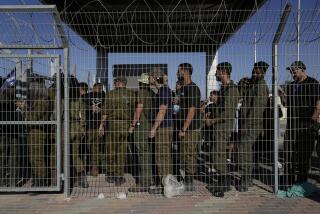Bosnian Serbs OK Camp Inspections : Balkans: The offer to the Red Cross comes in the wake of disturbing footage of emaciated prisoners, but there are signs many inmates have already been moved.
ZAGREB, Croatia — Bosnian Serbs, responding to mounting accusations that they are running brutal prison camps in northern Bosnia-Herzegovina, have agreed to allow Red Cross inspection of 12 of the camps, according to a Red Cross spokesman in Belgrade.
Matthias Kind, spokesman for the International Committee of the Red Cross, said that Serb leader Radovan Karadzic has agreed to a full inspection of the 12 sites, which he said includes the camp at Omarska, where journalists saw emaciated prisoners held behind barbed wire and confined in warehouses and equipment garages Thursday.
The television pictures of skeletal prisoners and newspaper interviews with former inmates of the camp have spurred outrage in Western capitals, where leaders are under renewed pressure to halt Serbian “ethnic cleansing” operations carried out against Muslim and Croatian civilians in the region and to force an inspection of conditions in the camps.
“We have been given the green light to go to any of the places on their list,” the Red Cross spokesman added. “Omarska is one of our priorities.”
But there were signs that Serbs may be rapidly clearing out Omarska and Karatan, another camp in an area that they have overrun since April.
A Reuters news service correspondent, in a visit to a prison camp at Manjaca, was told by camp commander Bozidar Popovic that 1,300 prisoners from Omarska had arrived at Manjaca in recent days. Journalists were not allowed to see the Omarska prisoners, but the inmates at Manjaca, out of the earshot of officials, spoke of beatings and deaths from neglect at the camp.
By midweek, Red Cross officials are expected to inspect the Banja Luka area of northern Bosnia, where Omarska and other suspected camps are located.
Bosnian officials allege that up to 17,000 Muslims and Croats have died in death camps, but no independent evidence has yet been found to substantiate their claims. The Bosnians claim that the Serbs are operating more than 100 prison camps. Serbs charge that Bosnian prison camps are also brutal.
Karadzic, in an interview with the German news magazine Der Spiegel, asserted that 6,000 Serbs have died in internment camps operated by Muslims or Croats.
Karadzic also told Der Spiegel that Serb irregulars fighting Bosnia’s independence from the remnants of Serbian-led Yugoslavia would never yield to international pressure and would fight any foreign intervention.
The Red Cross, which has visited only a handful of camps on either side, has declared them all deplorable.
And prisoner accounts of conditions in the Serb-run camps have consistently described brutal conditions and treatment.
Serbia, already cast as the chief aggressor in the war by the United States and other Western countries, allowed a British television crew and a handful of journalists a limited visit to the Omarska camp Thursday, evidently aimed at deflecting charges that the Serbs were using Nazi-like methods.
Although access to the camp was strictly limited, the move badly backfired as footage of the gaunt prisoners, some of them showing signs of having been beaten, was broadcast around the world.
President Bush said Friday that the United States “will not rest” until Serbs grant full access to their detention camps. But he also said any use of force would have to be taken in conjunction with the United Nations.
In an interview with the Associated Press on Saturday, Karadzic said he had proposed turning over all the camps under Serbian control to the Red Cross--which seemed to suggest that the Bosnian Serb leadership was effectively proposing the release of the prisoners, because the Red Cross does not consider the running of prison camps part of its mandate.
He also claimed he had ordered the immediate release of all prisoners over 60 years old, as well as all prisoners who are ill.
He told AP he favored an “all-for-all” prisoner exchange with the Muslim forces and said he is ready to close down all camps within three weeks if the other side is willing to do the same.
The Serbian leadership in Bosnia has a poor record of reliability in the lengthy--and so far fruitless--negotiations to arrive at a lasting cease-fire in Bosnia, but the furor over the prison camps, and the mounting international anger over “ethnic cleansing” policies, may be forcing a new reality on the Serbs, one in which some form of international intervention is no longer as remote as it once seemed.
In recent days, political figures in Britain and the United States have suggested that strategic air strikes against selected military targets such as ammunition depots might be used to force the Serbs to the bargaining table.
Britain has called for an emergency meeting of the U.N. Human Rights Commission to investigate the camps, and German Chancellor Helmut Kohl said in an interview to be published today that he supports Bush’s proposal to use military force to protect aid deliveries.
In Sarajevo, where 380,000 residents have endured a four-month Serbian siege, the international airlift of relief supplies resumed after a halt of four days, called when the airport came under heavy attack.
U.N. spokesman Mik Magnusson said the U.N. Protection Force is confident that an agreement on the airport would hold because “the tone of the commitment (from commanders of the fighting forces) was a little more convincing,” a comment that further hinted at a possible shift in Serbian strategy.
Gen. Philippe Morillon, deputy commander of the Protection Force, negotiated an agreement Friday with both sides to wind down fighting at the airport and the main road into the city.
Officials said they expected that about 20 planes with relief supplies would land Saturday.
More to Read
Sign up for Essential California
The most important California stories and recommendations in your inbox every morning.
You may occasionally receive promotional content from the Los Angeles Times.










